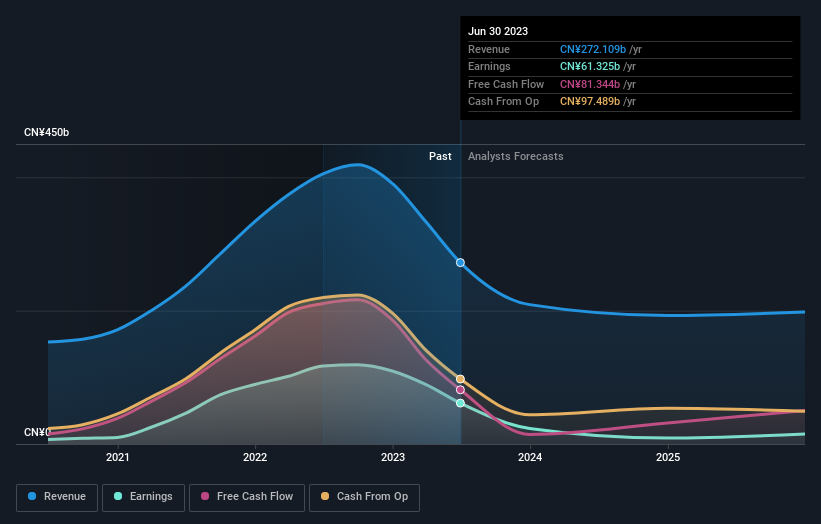- Hong Kong
- /
- Marine and Shipping
- /
- SEHK:1919
COSCO SHIPPING Holdings Co., Ltd.'s (HKG:1919) top owners are private companies with 52% stake, while 37% is held by individual investors

Key Insights
- COSCO SHIPPING Holdings' significant private companies ownership suggests that the key decisions are influenced by shareholders from the larger public
- A total of 3 investors have a majority stake in the company with 51% ownership
- Institutions own 10% of COSCO SHIPPING Holdings
Every investor in COSCO SHIPPING Holdings Co., Ltd. (HKG:1919) should be aware of the most powerful shareholder groups. We can see that private companies own the lion's share in the company with 52% ownership. That is, the group stands to benefit the most if the stock rises (or lose the most if there is a downturn).
Individual investors, on the other hand, account for 37% of the company's stockholders.
Let's take a closer look to see what the different types of shareholders can tell us about COSCO SHIPPING Holdings.
Check out our latest analysis for COSCO SHIPPING Holdings

What Does The Institutional Ownership Tell Us About COSCO SHIPPING Holdings?
Many institutions measure their performance against an index that approximates the local market. So they usually pay more attention to companies that are included in major indices.
We can see that COSCO SHIPPING Holdings does have institutional investors; and they hold a good portion of the company's stock. This implies the analysts working for those institutions have looked at the stock and they like it. But just like anyone else, they could be wrong. When multiple institutions own a stock, there's always a risk that they are in a 'crowded trade'. When such a trade goes wrong, multiple parties may compete to sell stock fast. This risk is higher in a company without a history of growth. You can see COSCO SHIPPING Holdings' historic earnings and revenue below, but keep in mind there's always more to the story.

COSCO SHIPPING Holdings is not owned by hedge funds. Our data shows that China COSCO SHIPPING Corporation Limited is the largest shareholder with 43% of shares outstanding. Meanwhile, the second and third largest shareholders, hold 5.0% and 2.3%, of the shares outstanding, respectively.
A more detailed study of the shareholder registry showed us that 3 of the top shareholders have a considerable amount of ownership in the company, via their 51% stake.
While studying institutional ownership for a company can add value to your research, it is also a good practice to research analyst recommendations to get a deeper understand of a stock's expected performance. There are a reasonable number of analysts covering the stock, so it might be useful to find out their aggregate view on the future.
Insider Ownership Of COSCO SHIPPING Holdings
The definition of an insider can differ slightly between different countries, but members of the board of directors always count. Management ultimately answers to the board. However, it is not uncommon for managers to be executive board members, especially if they are a founder or the CEO.
Most consider insider ownership a positive because it can indicate the board is well aligned with other shareholders. However, on some occasions too much power is concentrated within this group.
Our most recent data indicates that insiders own less than 1% of COSCO SHIPPING Holdings Co., Ltd.. But they may have an indirect interest through a corporate structure that we haven't picked up on. Being so large, we would not expect insiders to own a large proportion of the stock. Collectively, they own HK$424m of stock. Arguably recent buying and selling is just as important to consider. You can click here to see if insiders have been buying or selling.
General Public Ownership
With a 37% ownership, the general public, mostly comprising of individual investors, have some degree of sway over COSCO SHIPPING Holdings. This size of ownership, while considerable, may not be enough to change company policy if the decision is not in sync with other large shareholders.
Private Company Ownership
We can see that Private Companies own 52%, of the shares on issue. Private companies may be related parties. Sometimes insiders have an interest in a public company through a holding in a private company, rather than in their own capacity as an individual. While it's hard to draw any broad stroke conclusions, it is worth noting as an area for further research.
Next Steps:
While it is well worth considering the different groups that own a company, there are other factors that are even more important. For instance, we've identified 2 warning signs for COSCO SHIPPING Holdings (1 is significant) that you should be aware of.
If you would prefer discover what analysts are predicting in terms of future growth, do not miss this free report on analyst forecasts.
NB: Figures in this article are calculated using data from the last twelve months, which refer to the 12-month period ending on the last date of the month the financial statement is dated. This may not be consistent with full year annual report figures.
New: AI Stock Screener & Alerts
Our new AI Stock Screener scans the market every day to uncover opportunities.
• Dividend Powerhouses (3%+ Yield)
• Undervalued Small Caps with Insider Buying
• High growth Tech and AI Companies
Or build your own from over 50 metrics.
Have feedback on this article? Concerned about the content? Get in touch with us directly. Alternatively, email editorial-team (at) simplywallst.com.
This article by Simply Wall St is general in nature. We provide commentary based on historical data and analyst forecasts only using an unbiased methodology and our articles are not intended to be financial advice. It does not constitute a recommendation to buy or sell any stock, and does not take account of your objectives, or your financial situation. We aim to bring you long-term focused analysis driven by fundamental data. Note that our analysis may not factor in the latest price-sensitive company announcements or qualitative material. Simply Wall St has no position in any stocks mentioned.
About SEHK:1919
COSCO SHIPPING Holdings
An investment holding company, engages in the container shipping and terminal operations in the United States, Europe, the Asia Pacific, Mainland China, and internationally.
Outstanding track record with flawless balance sheet and pays a dividend.
Similar Companies
Market Insights
Community Narratives



